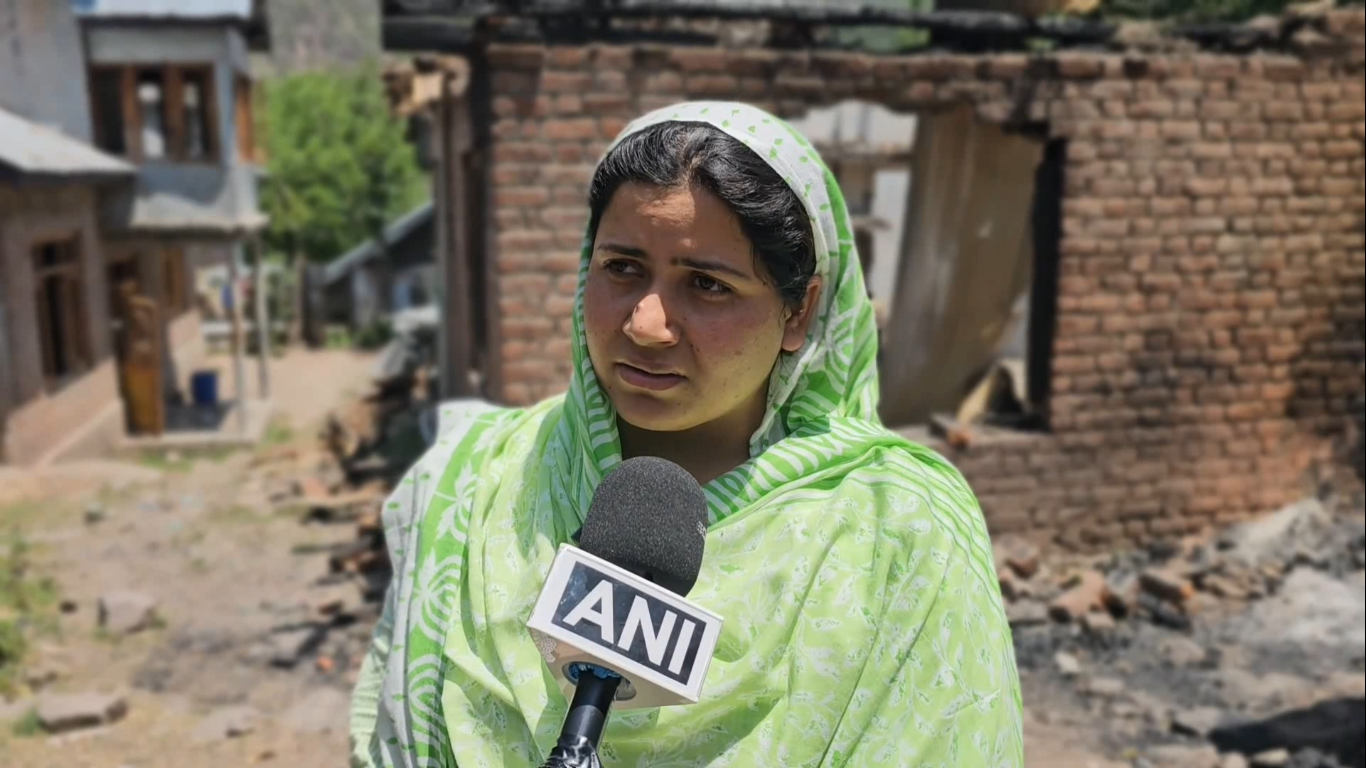A delegation of senior Bharatiya Janata Party (BJP) leaders, led by BJP General Secretary (Organisation) Ashok Koul and Jammu and Kashmir Waqf Board Chairperson Darakhshan Andrabi, on Sauturday visited several border villages in the Uri sector of Baramulla district in north Kashmir.
The visit aimed to assess the situation on the ground and express solidarity with the residents affected by Pakistani shelling post India's Operation Sindoor on May 7 which was launched in retaliation to April 22 Pahalgam, in which 26 people were killed.
Pakistan had targeted civilian areas along Jammu and Kashmir and the Line of Control (LoC), resulting in civilian deaths and significant damage to residential infrastructure.
The delegation interacted with families who suffered from the shelling, listening to their grievances and assuring them that their concerns would be conveyed to both the Central government and the UT administration to redress immediately. Local BJP leaders and party functionaries accompanied the delegation, emphasising the party's commitment to supporting border residents in times of crisis.
Darakhshan Andrabi, Senior BJP leader and Jammu and Kashmir Waqf Board Chairperson, speaking to ANI, said, "We have visited various places and seen the damage caused by cross-border shelling to the buildings. While the loss of life hasn't been significant, there has been a considerable financial loss. For now, we have provided all the immediate relief that we could."
She assured that a comprehensive assessment would be made, and the findings would be presented to the Central government to ensure aid and relief for those affected.
During the visit, the leaders toured damaged properties and interacted with community elders. They underscored the BJP's focus on ensuring security, compensation, and rehabilitation for those impacted. The delegation assured locals that their voices would be heard at the highest levels, advocating for concrete measures to address their hardships and improve their living conditions in the long term.
Saima, a victim of the border shelling, while speaking to ANI, said, "After the shelling, we suffered a lot of losses. We have nothing left except these clothes. We are appealing to the government to give us something, a place to stay. First of all, we need bunkers for our safety. We have nothing, my father is poor. Where will we get anything from?"
She continued, urging both India and Pakistan to hold dialogues: “We are suffering, and poor people like us are dying. We urge both countries to talk and find peace, as only through dialogue can peace be achieved.”
Another victim echoed similar sentiments, emphasising the need for a continued ceasefire.
He said, "We want the ceasefire to continue to ensure that the peace remains. Our agriculture, which was our livelihood, has been destroyed. We request the government to keep the ceasefire going so that we can educate our children and revive our businesses."
In addition, another resident shared, “Our homes have been destroyed by Pakistani shelling, and now we have nothing left. We don't have food, nothing to sustain us, just the clothes on our backs. We appeal to the government for peace so that we can survive and continue our daily work.”
The Waqf Chairman also highlighted the need for bunkers in border areas, saying, “People are demanding that we should have bunkers here. This is necessary because every house should have a bunker. When we build homes, we must think about safety from the start, especially in border areas where unfortunate incidents can happen at any time.”
Meanwhile, CM Abdullah emphasised the government's commitment to providing individual bunkers to residents in response to their demands.
"Again, bunkers are now a topic of discussion. For several years, we were not in need of bunkers. Now, the people have demanded individual bunkers, not community ones. We will arrange bunkers for all the regions affected by the shelling," CM Abdullah told reporters.
India launched Operation Sindoor on May 7 as a decisive military response to the April 22 Pahalgam terror attack in which 26 people were killed. Indian Armed Forces targeted terror infrastructure in Pakistan and Pakistan-occupied Jammu and Kashmir, leading to the death of over 100 terrorists affiliated with terror outfits like the Jaish-e-Mohammed, Lashkar-e-Taiba and Hizbul Mujahideen.
After the attack, Pakistan retaliated with cross-border shelling across the Line of Control and Jammu and Kashmir as well as attempted drone attacks along the border regions, following which, India launched a coordinated attack and damaged radar infrastructure, communication centres and airfields across 11 airbases in Pakistan.
After this, on May 10, an understanding regarding the cessation of hostilities between India and Pakistan was announced.
You may also like

What Eberechi Eze did after Crystal Palace FA Cup shock to leave huge Arsenal transfer message

Man Utd set to benefit if Fulham star seals transfer with cash windfall for Ruben Amorim

Union Minister Shivraj Chouhan sanctions 3.76 lakh additional houses under PMAY-G for Assam

State government giving priority to development of Solan: Himachal CM

Eurovision 2025 final LIVE: BBC host accidentally lets slip Eurovision winner minutes into







